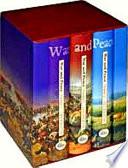
“Everything depends on upbringing.”
Variant: Everything intelligent is so boring.
Source: War and Peace

War and Peace is a novel by the Russian author Leo Tolstoy, published serially, then in its entirety in 1869. It is regarded as one of Tolstoy's finest literary achievements.The novel chronicles the French invasion of Russia and the impact of the Napoleonic era on Tsarist society through the stories of five Russian aristocratic families. Portions of an earlier version, titled The Year 1805, were serialized in The Russian Messenger from 1865 to 1867, then published in its entirety in 1869.Tolstoy said War and Peace is "not a novel, even less is it a poem, and still less a historical chronicle." Large sections, especially the later chapters, are philosophical discussion rather than narrative. Tolstoy also said that the best Russian literature does not conform to standards and hence hesitated to call War and Peace a novel. Instead, he regarded Anna Karenina as his first true novel.
“Everything depends on upbringing.”
Variant: Everything intelligent is so boring.
Source: War and Peace
About Platon Karataev in Bk. XII, ch. 13
War and Peace (1865–1867; 1869)
Epilogue II, ch. 1 http://www.classicreader.com/book/92/354/
War and Peace (1865–1867; 1869)
“All that may be so and mankind is ready to agree with it, but it is not what was asked.”
Vol 2, pt 5, p 236 — Selected Works, Moscow, 1869
War and Peace (1865–1867; 1869)
Context: The peculiar and amusing nature of those answers stems from the fact that modern history is like a deaf person who is in the habit of answering questions that no one has put to them.
If the purpose of history be to give a description of the movement of humanity and of the peoples, the first question — in the absence of a reply to which all the rest will be incomprehensible — is: what is the power that moves peoples? To this, modern history laboriously replies either that Napoleon was a great genius, or that Louis XIV was very proud, or that certain writers wrote certain books.
All that may be so and mankind is ready to agree with it, but it is not what was asked.
Bk. IX, ch. 1
War and Peace (1865–1867; 1869)
Context: In historical events great men — so-called — are but labels serving to give a name to the event, and like labels they have the least possible connection with the event itself. Every action of theirs, that seems to them an act of their own free will, is in an historical sense not free at all, but in bondage to the whole course of previous history, and predestined from all eternity.
“You will die and find out everything — or cease asking.”
Bk. V, ch. 1
War and Peace (1865–1867; 1869)
Context: You will die — and it will all be over. You will die and find out everything — or cease asking.